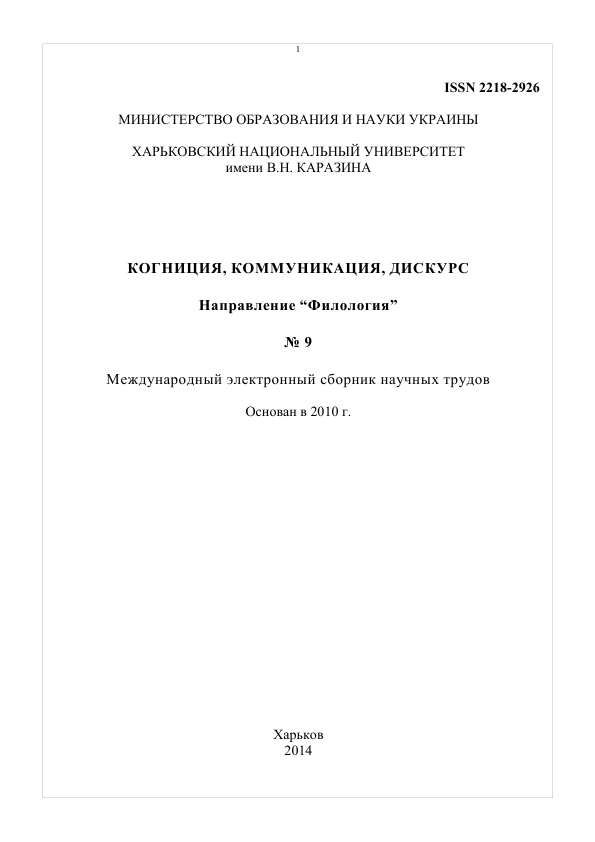Food advertisement in English: a cognitive linguistic analysis
Abstract
The paper aims to expose conceptual background underlying English language texts advertising food. The analysis of such texts has three objectives in view: to model the conceptual arrangement of products the texts advertise, to expose the features of these products, and to determine other conceptual constituents of the advertisements. The author argues that the obtained data pertain to the contents of a typical grocery basket native speakers of English consume and reveal the necessary elements of food advertisements which help to successfully promote the products in the marketplace.
Downloads
References
Anopina, O.V. (1997). Konceptual'naja struktura anglojazychnoj reklamy kosmetiki: informacionnyj frejm. Diss. dokt. filol. nauk [The conceptual framework of the English-language cosmetic advertising: information frame. Dr. philol. sci. diss.]. Cherkassy. 160 p. (in Russian)
Belova, A.D. Lingvisticheskie aspekty argumentacii [Linguistic aspects of argumentation]. Kiev: Kievskij nacional'nyj universitet im. T. Shevchenko. Publ.
Dobrovena, V.V. (2005). Professional'no-korporativnaja leksika v tekste reklamy [Vocational and corporate vocabulary in the text of advertisement]. Visnyk Kharkivskoho universytetu – Kharkiv University Bulletin, 667, 12-13 (in Russian)
Garashhenko, E.D. (1999). Kommunikativno-strategicheskie aspekty reklamnogo diskursa [Communicative and strategic aspects of advertising discourse]. Visnyk Kharkivskoho universytetu – Kharkiv University Bulletin, 424, 14-16 (in Russian)
Goddard, A. (1998).The Language of Advertising. London: Routledge and Kegan Paul
Kara-Murza, E.S. (2001). «Divnyj novyj mir» rossijskoj reklamy: sociokul'turnye, stilisticheskie i kul'turno-rechevye aspekty ["Brave New World" of Russian advertising: social and cultural, stylistic, cultural and speech aspects]. In: Slovar' i kul'tura russkoj rechi. K 100-letiju so dnja rozhdenija S.I. Ozhegova [Dictionary and culture of Russian speech. On the 100th anniversary of the birth of S.I. Ozhegova]. Moscow: Indrik Publ, pp. 165-166
Kubrjakova, E.S. (1991). Osobennosti rechevoj dejatel'nosti i problemy vnutrennego leksikona [Features of speech and the problem of internal lexicon]. In: Chelovecheskij faktor v jazyke. Jazyk i porozhdenie rechi [Human factor in language. Language and speech production]. Moscow: Nauka Publ, pp. 82-137
Kyrylova, O.I. (1991). Deiaki zasoby intensyfikatsii ekspresyvnosti v anglomovnii reklami tekstu [Some means of intensifying expressiveness in English advertising of the text]. Available at: http://www.5ka.ru/29/4874/1.html
Lysychkina, I.O. (2005). Prosodychna orhanizatsiia anhlomovnoho dyskursu reklamy. Avtoref. diss. kand. filol. nauk [Prosodic organization of English advertising discourse. Synopsis cand. philol. sci. diss.]. Kiev. 19 p. (in Ukrainian)
Maevskaja, A.D. (2006). Informacija, peredavaemaja jazykom reklamy [Information transmitting through the language of advertising]. Visnyk Kharkivskoho universytetu – Kharkiv University Bulletin, 741, 21-23 (in Russian)
Maslova, N.I., Papovjanc, Je. G. (1999). Kommunikativno-funkcional'naja tipologija slogana v anglo- i ukrainojazychnoj reklame [Communicative and functional typology of slogan in English and Ukrainian advertising]. Visnyk Kharkivskoho universytetu – Kharkiv University Bulletin,430,54-57
Mojseenko, I.P. (1994). Semantic characteristics of the text of advertisement. 3-ja Mezhdunarodnaja konferencija «Jazyk i kul'tura»: Doklady i tezisy. [3rd International Conference "Language and Culture": Reports and theses].Kiev: Prosvita Publ., 123-124.
Nalimov, V.V. (1989). Spontannost' soznanija [Spontaneous Mind]. Moscow: Majak Publ.
Nazarov, M.M. (2002). Massovaja kommunikacija v sovremennom mire [Mass communication in the modern world]. Moscow: Editoria Publ.
Nizhegorodceva-Kirichenko, L.A. (2000). Leksiko-semanticheskoe pole intellektual'noj dejatel'nosti: opyt konceptual'nogo analiza (na material sushhestvitel'nyh sovremennogo anglijskogo jazyka). Diss. kand. filol. Nauk [Lexical and semantic field of intellectual activity: the experience of conceptual analysis (based on the nouns of modern English). Cand. philol. sci. diss.]. Kiev. 257 p. (in Russian)
Radu, A.I. (2004). Typolohia ta linhvostylistychni osoblyvosti funktsionuvannia dilovoi reklamy. Avtoref. diss. kand. filol. nauk. [Typology and stylistic features of functioning business advertising. Synopsis cand. philol. sci. diss.]. Zaporizhia. 20 p. (in Ukrainian)
Rogozina, I.V. (2003). Media-kartina mira: kognitivno-semioticheskij aspekt [Media picture of the world: a cognitive-semiotic aspect]. Moscow-Barnaul: AstroPress
Sokolova, H.V. (2003). Vmotyvovanist spryiniattia reklamnoho tekstu ta movni zasoby stvorennia [Motivation of the perception of the text of advertisement and linguistic means of creating]. Visnyk Kharkivskoho universytetu – Kharkiv University Bulletin,611, 8-9 (in Ukrainian)
Zhabotinskaja, S.A. (2004). Konceptual'nyj analiz jazyka: frejmovye seti [Conceptual analysis of language: frame-based network]. Mova. Naukovo-teoretychnui chasopys iz movoznavstva – Language. Scientific and theoretical linguistic journal, 9, 81-92
Zhabotinskaja, S.A. (2008) Principy lingvokognitivnogo analiza i fenomen polisemii [Linguistic and cognitive analysis principles and the phenomenon of polysemy]. In: Zhabotinskaja, S.A. Problemy zahalnoho, hermanskoho ta slovianskoho movoznavstva. Do 70-richia profesora V.V. Levytskoho [Problems of general, Germanic and Slavic linguistics. On the 70th anniversary of professor V.V. Levytskyi]. Chernivsti: Knyhy XXI stolittia Publ, pp. 357-368
Zhabotinskaja, S.A. (2011). Elementary code and dynamics of conceptual structures (natural language data). Trudy konferencii Nelinejnaja dinamika v kognitivnyh issledovanijah, Nizhniy Novgorod. [Proc. of the conference Nonlinear dynamics in cognitive studies, Nizhniy Novgorod]. Nizhniy Novgorod, 57-60.
Zirka, A.A. (2005). Movna paradyhma manipuliatyvnoi hry v reklami. Avtoref. diss. dokt. filol. nauk [Language paradigm of the manipulative game in advertising. Synopsis Dr. philol. sci. diss.]. Kiev. 32 p. (in Ukrainian)
Authors, who publish with this journal, accept the following conditions:
The authors reserve the copyright of their work and transfer to the journal the right of the first publication of this work under the terms of the Creative Commons Attribution License (CC BY), which allows other persons to freely distribute a published work with mandatory reference to the authors of the original work and the first publication of the work in this journal.
Authors have the right to enter into separate additional agreements for the non-exclusive dissemination of the work in the form in which it was published by this journal (for example, to post the work in the electronic institutions' repository or to publish as part of a monograph), provided that the link to the first publication of the work in this journal is given.
The journal policy allows and encourages the authors to place the manuscripts on the Internet (for example, in the institutions' repositories or on personal websites), both before the presentation of this manuscript to the editorial board and during review procedure, as it contributes to the creation of productive scientific discussion and positively affects the efficiency and dynamics of citing the published work (see The Effect of Open Access).




